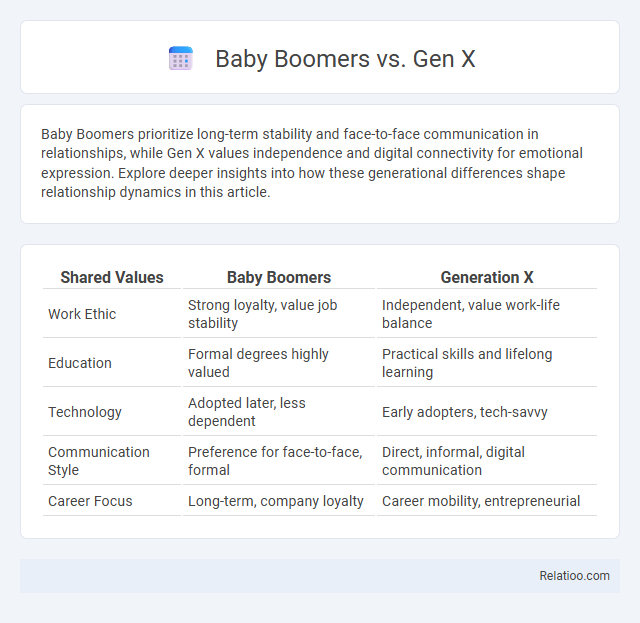Baby Boomers prioritize long-term stability and face-to-face communication in relationships, while Gen X values independence and digital connectivity for emotional expression. Explore deeper insights into how these generational differences shape relationship dynamics in this article.
Table of Comparison
| Shared Values | Baby Boomers | Generation X |
|---|---|---|
| Work Ethic | Strong loyalty, value job stability | Independent, value work-life balance |
| Education | Formal degrees highly valued | Practical skills and lifelong learning |
| Technology | Adopted later, less dependent | Early adopters, tech-savvy |
| Communication Style | Preference for face-to-face, formal | Direct, informal, digital communication |
| Career Focus | Long-term, company loyalty | Career mobility, entrepreneurial |
Defining Baby Boomers and Gen X
Baby Boomers, born between 1946 and 1964, are characterized by their post-World War II upbringing, strong work ethic, and significant influence on cultural and economic shifts. Generation X, born between 1965 and 1980, is recognized for its adaptability, independence, and role as a bridge between analog and digital eras. Understanding these generational definitions helps clarify differences in values, work styles, and technology adoption across Baby Boomers and Gen X.
Key Historical Influences
Baby Boomers experienced post-World War II economic growth and the rise of television, shaping their values around stability and consumerism. Gen X witnessed the digital revolution, economic recessions, and shifting social norms, influencing their adaptability and independent mindset. Understanding these key historical influences helps you appreciate generational differences in work ethic, communication, and cultural perspectives.
Core Values and Belief Systems
Baby Boomers prioritize loyalty, hard work, and a strong sense of community, valuing stability and traditional success metrics. Gen X emphasizes independence, self-reliance, and work-life balance, often skeptical of institutions and authority. Understanding these core values helps you navigate intergenerational dynamics and fosters better communication across Baby Boomers, Gen X, and emerging generational groups.
Work Ethic and Career Attitudes
Baby Boomers prioritize loyalty, long hours, and hierarchical advancement, valuing job security and company loyalty as core components of work ethic. Gen X emphasizes independence, work-life balance, and skill acquisition, often questioning traditional career paths and seeking flexibility in their professional lives. Your approach to career development may benefit from understanding these generational differences to foster collaboration and leverage diverse work attitudes effectively.
Technology Adoption and Usage
Baby Boomers, born between 1946 and 1964, tend to adopt technology more slowly, favoring traditional devices like desktops and landlines, while Gen X, born from 1965 to 1980, quickly embraces new tech such as smartphones and social media platforms. Your experience with technology varies significantly across these generations, impacting work habits, communication styles, and digital fluency. Understanding these generational differences helps tailor digital solutions for optimal engagement and user experience.
Financial Perspectives and Spending Habits
Baby Boomers prioritize financial security with a focus on saving and long-term investments, often favoring stable assets like real estate and retirement funds. Gen X balances cautious saving with strategic spending, emphasizing education, family needs, and technology investments, reflecting their dual role as caregivers and professionals. Generational shifts highlight Baby Boomers' conservative approach compared to Gen X's adaptability and willingness to engage in digital financial tools and experiential spending.
Family Life and Parenting Styles
Baby Boomers often emphasize traditional family values with a focus on stability and discipline in parenting, reflecting their post-war upbringing. Generation X tends to adopt a more pragmatic and flexible approach, balancing work and family life while encouraging independence and self-reliance in children. Generational shifts reveal evolving family dynamics, where parenting styles become increasingly adaptive to social changes and technological advancements.
Communication Preferences
Baby Boomers prefer face-to-face communication and telephone calls, valuing personal interaction and clarity. Generation X favors email and direct messaging, appreciating efficiency and flexibility in conversations. Generational communication preferences reflect shifting technology usage, with Boomers leaning towards traditional methods and Gen X embracing digital tools for workplace and personal interactions.
Cultural Impact and Contributions
Baby Boomers shaped cultural norms through their influence on music, civil rights, and economic growth, driving significant social change in the mid-20th century. Gen X brought a shift toward technological innovation, diversity, and independent thinking, impacting media, workplace culture, and digital communication. Understanding the generational differences helps you appreciate how each group's unique contributions continue to define societal values and cultural evolution.
Intergenerational Challenges and Opportunities
Baby Boomers, born between 1946 and 1964, often emphasize work ethic and loyalty, while Gen X, born between 1965 and 1980, values independence and adaptability, creating distinct workplace dynamics that challenge intergenerational communication. Generational differences manifest in technology adoption, communication styles, and career expectations, leading to misunderstandings but also opportunities for knowledge transfer and innovation. Leveraging the experience of Boomers and the tech-savviness of Gen X can foster a collaborative environment that drives organizational growth and resilience.

Infographic: Baby Boomers vs Gen X
 relatioo.com
relatioo.com